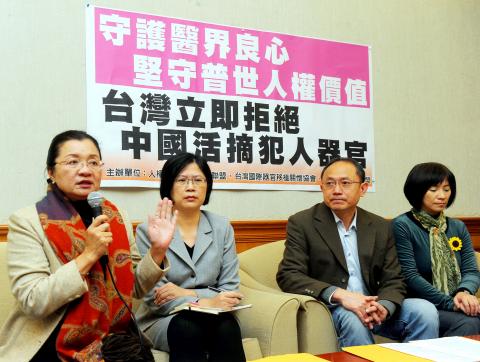|
Reject China’s organ proposal: rights activists
By Stacy Hsu / Staff reporter Staff reporter

Democratic Progressive Party Legislator Tien Chiu-chin, left, and human rights lawyer Theresa Chu, second left, hold a press conference in the Legislative Yuan in Taipei yesterday, calling on people to reject proposals for a cross-strait organ transplant mechanism.
Photo: CNA
Several medical and human rights groups yesterday urged the government to reject a proposal by former Chinese deputy minister of health Huang Jiefu (黃潔夫) to establish a mechanism to facilitate organ donations from China to Taiwan, which they said could make the country an accomplice to allegedly rampant unethical organ retrieval practices in China.
“China has long been notorious for its alleged harvesting of organs from unidentified sources, in which human rights might have been violated,” Covenants and Conventions Watch convener Huang Song-lih (黃嵩立) told a press conference in Taipei.
He said that support for the proposed plan by Presidential Office senior adviser Steve Chan (詹啟賢) and Taipei mayor-elect Ko Wen-je’s (柯文哲) failure to bring up the controversial organ retrieval issue during his recent meeting with Huang Jiefu would only facilitate “the doings of evil” and should be denounced.
Huang Jiefu, who now heads the National Organ Transplantation Committee at China’s National Health and Family Planning Commission, visited Taiwan last week. He proposed the idea to set up a platform to legally transport organs from China when he visited Kaohsiung Chang Gung Memorial Hospital on Friday last week, saying the mechanism would spare Taiwanese the trouble of seeking organs for transplant in China via under-the-table channels.
Huang Song-lih said that over the past 14 years, nearly 3,700 Taiwanese risked their health and put away their conscience to receive organ transplants in China without knowing the source of the donor organs.
“According to Huang Jiefu, China saw a record-high 1,500 organ donors this year, but there are more than 300,000 Chinese citizens on the organ waiting list. Given the circumstances, how can China possibly provide organs to Taiwanese patients? Where will these organs come from?” he said.
A Chinese newspaper quoted Huang Jiefu as having said earlier this month that if death-row prisoners voluntarily gave consent for organ donation, their organs would be deemed as being donated by a “citizen” rather than harvested from an executed inmate, Huang Song-lih said.
“Such a remark proves that Beijing’s oft-trumpeted cessation of transplanting organs taken from executed prisoners starting on Jan. 1 in response to human rights concerns is nothing but a lie,” he said.
“Since the Chinese government has sentenced not only murderers to death, but also political prisoners and prisoners of conscience, agreeing to receive organs from such sources is no different from ‘lending China a knife to kill innocent men,’” he added.
Taiwan Association for International Care of Organ Transplants deputy director-general Huang Shi-wei (黃士維) said transparency and traceability are the two basic requirements for organ donation and transplant.
“If China is really serious about improving its organ donation system, it should start by releasing a list detailing the exact numbers of organ transplant surgeries carried by its 600 hospitals between 2000 and this year, and how many of the death-row inmates it executed during the same period had their organs retrieved,” he said.
“If it fails to do so, how can anyone believe that the organs harvested two weeks later there will be obtained in an ethical manner and that its reform pledge is not just a cover for its immoral organ harvesting?” he asked.
The groups also issued four demands: that the medical community issue a statement dismissing the proposal and refrain from transferring patients to China; that the government revises the Human Organ Transplantation Act (人體器官移植條例) to achieve national self-sufficiency in organ donation and transplantation; that China uphold human rights and stop removing organs from living death-row prisoners; and that all sectors in Taiwan adhere to human right standards and ethical codes.
source: Taipei Times
|